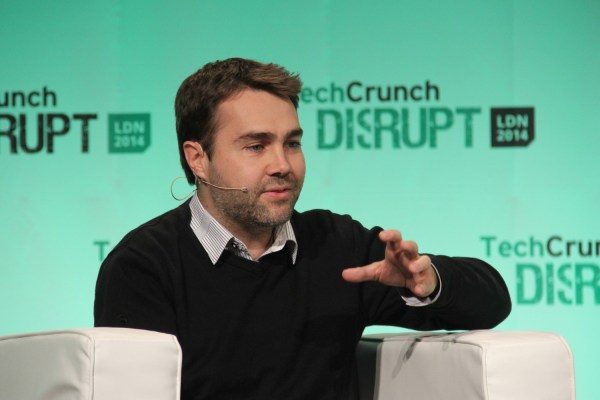Taxi apps and ride-sharing companies may have gained mainstream appeal over the past couple of years, but their arrival has been a long time coming.
That’s certainly the case for BlaBlaCar, a France-headquartered startup that was started 10 years ago and just raised a whopping $100 million to expand its business from Europe into the rest of the world.
In an all-French panel session at Disrupt Europe, BlaBlaCar CEO and co-founder Frédéric Mazzella told TechCrunch writer Romain Dillet that the sudden rush of capital hasn’t gone to the Parisian startup’s proverbial head.
“We’ve been discussing our business with investors for many years,” Mazzella said. “Each time we’ve raised money, we’ve had a goal.”
BlaBlaCar’s first raise — $600,000 in 2009 — was aimed at making it France’s premier ride-sharing services, he continued. Subsequent rounds — $1.2 million and $7.5 million — were targeted at finding a business model for revenue and replicating its French model in neighboring countries in Europe.
And this latest round?
“The $100 million round just now is to help us become global,” Mazzella confirmed. “We have to take what’s proven successful in the countries we are, and go to the next level.”
The BlaBlaCar founder said that, having just opened its doors in Turkey, the team is now looking at large markets like India and Brazil.
“We want to reach economies of scale, so we are looking at big countries. [When assessing new expansions] we look at the price of gas, the state of transport in general, and how people are connected — are they using their smartphones? — then we make a call on whether it can work,” Mazzella explained.
For now, he believes that “everywhere is working” in its markets, but he did concede that growth in the UK has been particularly challenging due to culture issues.
“The UK is an island so distances traveled are different. Rides are often based on commutes to work rather than weekends with family or friends like in Europe,” Mazzella said.
That said, he does believe that things will change in the UK and other markets, just like they did in France where “it took a while for people to get used to the idea you can share your car with someone you don’t know.”
[gallery ids="1073691,1073695,1073693,1073694,1073690,1073689,1073688"]
All this talk of expansion leaves an obvious question — will BlaBlaCar try its luck in the US market?
The answer seems sooner rather than later.
While he didn’t commit to any kind of timeline for a North American launch, Mazzella said — not for the first time — that the company has assessed the business potential of the US.
“We can’t just do everything at once… frankly I don’t known when we might go to the US,” he said. Playing things down even further, he voiced a series of concerns about the feasibility of the business of long distance ride-sharing there.
“It doesn’t really work in the US. Several companies have tried and failed [due to differences]: gas and tolls are cheaper than other countries, which means there is less incentive for drivers to share rides,” Mazzella said.
The fact that no single competitor has cornered the market in the US is evidence that, while there is interest, the time is not right, Mazzella believes.
As it stands, BlaBlaCar has 10 million registered users across 13 different countries. Mazzella said the service sees 2 million people traveling on it per month.
Despite its recent successes — and that has included front page stories on national newspapers in France as well as coverage from online sites like TechCrunch — Mazzella has his head firmly on his shoulders. He told Dillet that he has not taken time off to party or celebrate the progress since there is a lot more to come from BlaBlaCar.
